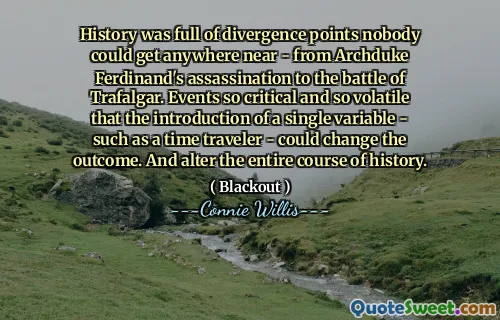
History was full of divergence points nobody could get anywhere near - from Archduke Ferdinand's assassination to the battle of Trafalgar. Events so critical and so volatile that the introduction of a single variable - such as a time traveler - could change the outcome. And alter the entire course of history.
This quote vividly highlights the intricate and fragile nature of historical events, emphasizing how seemingly minor changes could ripple through time and drastically alter the course of history. It reminds us that history is often shaped by crucial turning points—like the assassination of Archduke Ferdinand or the Battle of Trafalgar—that serve as pivotal moments dictating the future. The notion of divergence points underscores the idea that while history appears linear in retelling, it is in fact full of alternatives—branching paths that could have led to vastly different realities. This brings to mind the delicate balance of causality, where small deviations might produce unpredictable and profound consequences, akin to how chaos theory describes sensitive dependence on initial conditions. The mention of a time traveler introduces a speculative but fascinating concept: that if one could go back and alter a single event at such a divergence point, the entire trajectory of human history might shift, leading to unintended and perhaps dangerous outcomes. Such thought experiments are not only captivating for science fiction but also serve as philosophical reflections on the interconnectedness of events. They invite us to consider the weight of every decision and occurrence, no matter how insignificant it might seem at the moment. In contemplating these divergence points, we gain an appreciation for both the complexity of history and the humility needed to respect its uncertainties. Recognizing these delicate junctures fosters a deeper understanding of the significance behind pivotal moments and the paths humanity takes through time.







